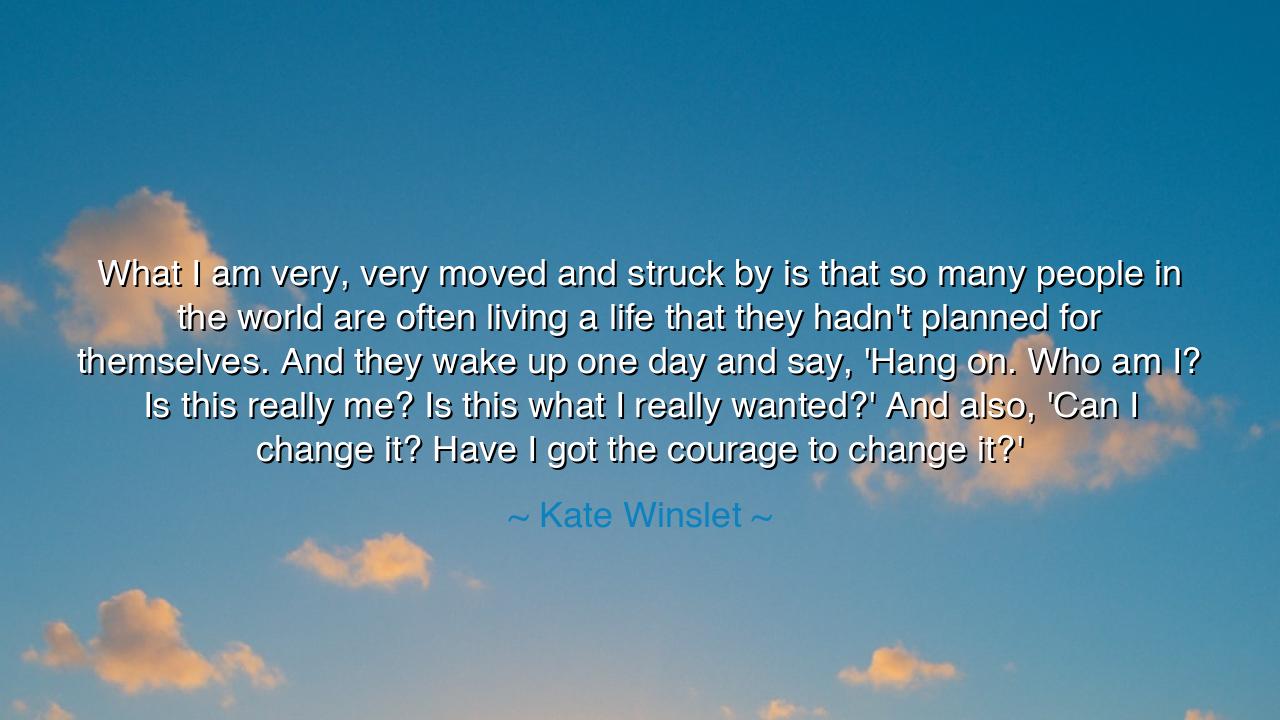
What I am very, very moved and struck by is that so many people
What I am very, very moved and struck by is that so many people in the world are often living a life that they hadn't planned for themselves. And they wake up one day and say, 'Hang on. Who am I? Is this really me? Is this what I really wanted?' And also, 'Can I change it? Have I got the courage to change it?'






When Kate Winslet said, “What I am very, very moved and struck by is that so many people in the world are often living a life that they hadn’t planned for themselves. And they wake up one day and say, ‘Hang on. Who am I? Is this really me? Is this what I really wanted?’ And also, ‘Can I change it? Have I got the courage to change it?’” — she spoke not merely as an actress, but as a seeker of truth. Beneath her words lies a question as ancient as humankind itself: What does it mean to live truly — to live as oneself, not as the mask the world has chosen for us? It is a question that has haunted kings and beggars, poets and laborers alike. For every soul, at least once in its life, awakens from the dream of habit and hears the whisper: This is not who I was meant to be.
From the beginning of civilization, men and women have built lives upon expectation — the wishes of parents, the rules of society, the comfort of the familiar. Yet, as the years pass, something inside them begins to stir. It is the voice of the authentic self, buried but unbroken, asking to be remembered. Winslet’s words capture that sacred awakening — the moment when a person looks at their reflection and realizes that they have been living another’s story. This realization is both terrifying and divine. For to see that one’s life is not one’s own is to stand at the edge of freedom, trembling between despair and possibility.
The ancients would have called this the moment of self-reckoning. Socrates said, “Know thyself,” not as a casual thought, but as a command of the soul. To know oneself requires courage, for it often means destroying the false identity that has been carefully built over years of compromise. Winslet’s question — “Can I change it? Have I got the courage to change it?” — echoes through the ages as the cry of all who have dared to break free. For to change one’s life is not merely to alter circumstances; it is to reclaim one’s essence. It demands the bravery to disappoint others, to face uncertainty, and to walk alone in pursuit of truth.
Consider the story of Vincent van Gogh, who lived most of his life misunderstood and destitute, rejected by those he sought to love. He might have chosen the safer road — a quiet, respectable existence — but he could not betray the calling within him. He painted not because it brought him wealth or peace, but because it was his true self expressing life. Though he died in obscurity, his art later became a light for generations. His story teaches us that authenticity often requires suffering, yet from that suffering arises beauty and immortality. To live as oneself is to live courageously, even when the world calls it madness.
Winslet’s words also carry compassion for those who feel trapped. Many, she observes, awaken too late — or believe it is too late. They whisper, “I cannot change; my life is already set.” But this is the greatest illusion of all. As long as breath remains, choice remains. The human spirit is infinitely renewable. To begin again at forty, at sixty, even at the end — this is the miracle of life. The ancients compared the soul to fire: it can dim, but it cannot die. All it needs is air — the air of truth, of honesty, of courage — and it burns once more.
And yet, courage is the bridge between knowing and becoming. To see the truth is not enough; one must act upon it. This is why Winslet’s final question is the most powerful of all: “Have I got the courage to change it?” For knowledge without action is paralysis. The heart may ache for transformation, but fear chains it to the familiar. Thus, the path to freedom begins not with clarity, but with bravery — the willingness to take one step, however small, toward a life that feels real. Those who do so may lose much — approval, stability, comfort — but they gain something far greater: the peace of being whole.
So, my listener, when your own dawn of awareness comes — when you wake one morning and hear that quiet voice asking, “Who am I?” — do not turn away. Welcome it as the birth cry of your truest self. Reflect, but do not linger in regret. Ask yourself, “Is this really me?” And if the answer is no, then take the next question as a summons from destiny: “Have I the courage to change it?” For to change one’s life is to reclaim one’s soul. And though the path may be steep, it leads toward freedom — the freedom to live, not as others expect, but as you were always meant to be. That is the truest form of courage, and the purest act of compassion — to live your own life honestly, and to become, at last, yourself.






AAdministratorAdministrator
Welcome, honored guests. Please leave a comment, we will respond soon